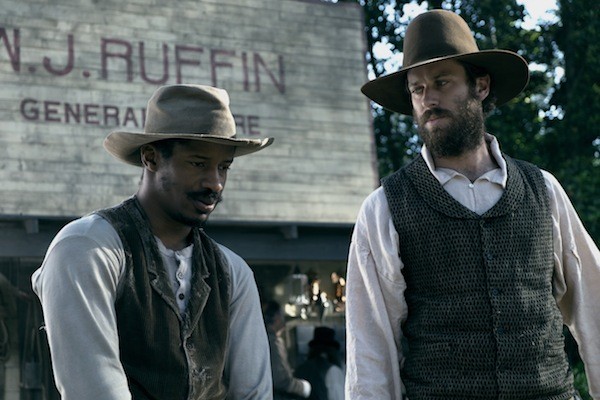THE BIRTH OF A NATION
*** (out of four)
DIRECTED BY Nate Parker
STARS Nate Parker, Armie Hammer

- Nate Parker and Armie Hammer in The Birth of a Nation (Photo: Fox Searchlight)
Now as always, it's important to separate the artist from the art, although in the case of Nate Parker and his motion picture The Birth of a Nation, that's often difficult to do. In 1994's Bullets Over Broadway, a scandal-plagued Woody Allen has one of his characters declare that "An artist creates his own moral universe." Great movie, ludicrous and self-serving line. And now, Parker and co-scripter Jean Celestin, both at the center of controversy for the college rape of a girl who then suffered from depression and committed suicide years later (Parker was acquitted while Celestin was initially convicted before being acquitted as well), has made sure to include the scene where Nat Turner offers forgiveness and baptism to a white man seeking to atone for all his past sins. "I forgive you" is the message to the man from Turner. "I forgive myself" is Parker's message to himself.
The Birth of a Nation is problematic in other ways as well. It tells the story of Turner from his childhood to his execution, and it details how this man (played as an adult by Parker himself) who initially was rented out by his owner (Armie Hammer) to quote from the Scriptures in an effort to assuage unruly slaves later found Biblical words to support his growing belief that the atrocities being committed against blacks needed to be stopped by any means necessary. Historical record asserts that his decision to lead an uprising stemmed wholly from his belief that it was a mandate from God, yet in the movie, it's turned into a Death Wish scenario, with Turner largely motivated by the rape and beating suffered by his wife Cherry (a fine turn by Aja Naomi King) at the hands of white crackers (a second slave, one played by Gabrielle Union, also gets raped and triggers Turner's rage). Employing a non-documented rape for this purpose is, at best, queasy and tone-deaf and, at worst, heinous and insensitive. And while the picture shows Turner's army slaughtering scores of white men and even some women, it's careful not to show any children getting murdered, even though several were. It's an understandable omission, but also a misleading one.
And yet, to deny the power and importance of The Birth of a Nation as its own entity would be equally misleading. While not in the same class as the excellent, Oscar-winning 12 Years a Slave, this picture nevertheless has plenty of merit, starting with a title that brilliantly recalls the one for D.W. Griffith's 1915 racist opus and throws it back in its face. It's a film that's about as subtle as a sledgehammer to the groin area, and yet its righteous anger helps rather than hinders the piece, particularly in the ghastly sequences in which Turner stands by helplessly as enormous evils are committed against his fellow sufferers (the "dental" scene is almost unwatchable). Production values are top-notch, with the camerawork by Elliot Davis particularly worthy of praise: Displaying remarkable range, the d.p. traffics in dark, dour shots that suit the material but then also tosses in some sequences of notable beauty and grace.
Most crucially, though, this is a movie for the here and now, a document that nicely supports the BlackLivesMatter movement (and throws shade on the AllLivesMatter nonsense; sorry, the lives of those who still think like the vicious slave owners showcased here do not matter). Once the rebellion is quelled and whites start slaughtering blacks by the dozens (even ones who had nothing to do with the uprising), Cherry cries, "They're killing people everywhere, for no reason but being black" — a chilling line in an era in which black males are being systematically gunned down at an alarming rate. Nate Parker may be a vile and unrepentant abuser, but whatever one thinks of the messenger, the delivered movie is worthy of attention. Now, whether you want to support his career through ticket sales is entirely up to you.


